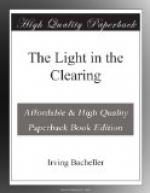“What business have you got enlargin’ yer family—takin’ another mouth to feed and another body to spin for? That costs money. I ain’t no objection if a man can afford it, but the money it costs ain’t yours to give. It looks as if it belonged to me. You spend yer nights readin’ books when ye ought to be to work an’ you’ve scattered that kind o’ foolishness all over the neighborhood. I want to tell you one thing, Baynes, you’ve got to pay up or git out o’ here.”
He raised his cane and shook it in the air as he spoke.
“Oh, I ain’t no doubt o’ that,” said Uncle Peabody. “You’ll have to have yer money—that’s sure; an’ you will have it if I live, every cent of it. This boy is goin’ to be a great help to me—you don’t know what a good boy he is and what a comfort he’s been to us!”
I had understood that reference to me in Mr. Grimshaw’s complaint and these words of my beloved uncle uncovered my emotions so that I put my elbow on the wood-box and leaned my head upon it and sobbed.
“I tell ye I’d rather have that boy than all the money you’ve got, Mr. Grimshaw,” Uncle Peabody added.
My aunt came and patted my shoulder and said: “Sh—sh—sh! Don’t you care, Bart! You’re just the same as if you was our own boy—ayes!—you be.”
“I ain’t goin’ to be hard on ye, Baynes,” said Mr. Grimshaw as he rose from his chair; “I’ll give ye three months to see what you can do. I wouldn’t wonder if the boy would turn out all right. He’s big an’ cordy of his age an’ a purty likely boy they tell me. He’d ‘a’ been all right at the county house until he was old enough to earn his livin’, but you was too proud for that—wasn’t ye? I don’t mind pride unless it keeps a man from payin’ his honest debts. You ought to have better sense.”
“An’ you ought to keep yer breath to cool yer porridge,” said Uncle Peabody.
Mr. Grimshaw opened the door and stood for a moment looking at us and added in a milder tone: “You’ve got one o’ the best farms in this town an’ if ye work hard an’ use common sense ye ought to be out o’ debt in five years—mebbe less.”
He closed the door and went away.
Neither of us moved or spoke as we listened to his footsteps on the gravel path that went down to the road and to the sound of his buggy as he drove away. Then Uncle Peabody broke the silence by saying:
“He’s the dam’dest—”
He stopped, set the half-splintered stick aside, closed his jackknife and went to the water-pail to cool his emotions with a drink.
Aunt Deel took up the subject where he had dropped it, as if no half-expressed sentiment would satisfy her, saying:
“—old skinflint that ever lived in this world, ayes! I ain’t goin’ to hold down my opinion o’ that man no longer, ayes! I can’t. It’s too powerful—ayes!”
Having recovered my composure I repeated that I should like to give up school and stay at home and work.




